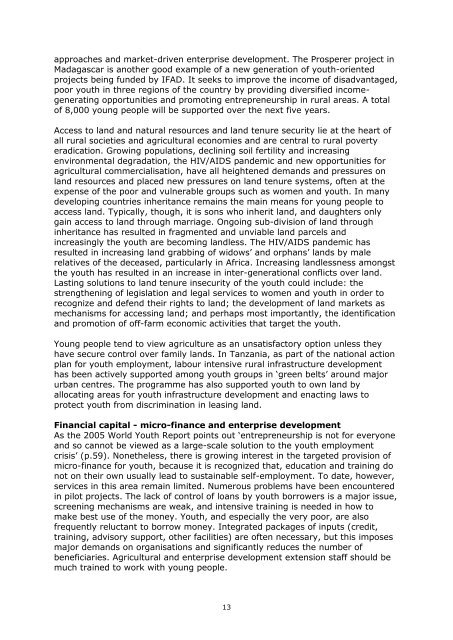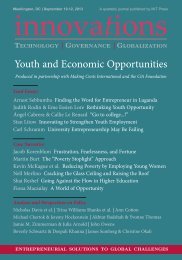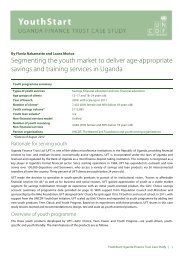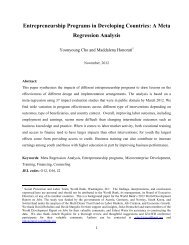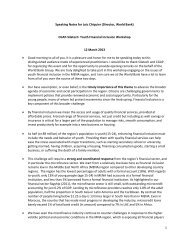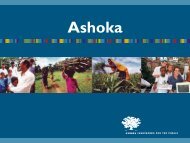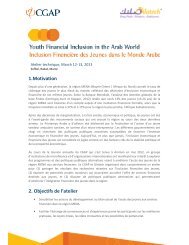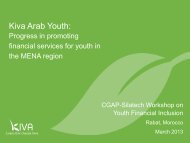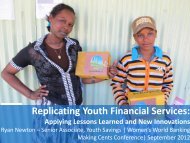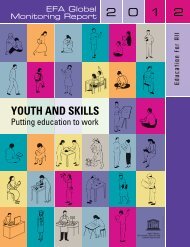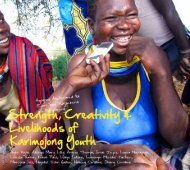Investing in the future: Creating opportunities for young rural ... - IFAD
Investing in the future: Creating opportunities for young rural ... - IFAD
Investing in the future: Creating opportunities for young rural ... - IFAD
You also want an ePaper? Increase the reach of your titles
YUMPU automatically turns print PDFs into web optimized ePapers that Google loves.
approaches and market-driven enterprise development. The Prosperer project <strong>in</strong><br />
Madagascar is ano<strong>the</strong>r good example of a new generation of youth-oriented<br />
projects be<strong>in</strong>g funded by <strong>IFAD</strong>. It seeks to improve <strong>the</strong> <strong>in</strong>come of disadvantaged,<br />
poor youth <strong>in</strong> three regions of <strong>the</strong> country by provid<strong>in</strong>g diversified <strong>in</strong>comegenerat<strong>in</strong>g<br />
<strong>opportunities</strong> and promot<strong>in</strong>g entrepreneurship <strong>in</strong> <strong>rural</strong> areas. A total<br />
of 8,000 <strong>young</strong> people will be supported over <strong>the</strong> next five years.<br />
Access to land and natural resources and land tenure security lie at <strong>the</strong> heart of<br />
all <strong>rural</strong> societies and agricultural economies and are central to <strong>rural</strong> poverty<br />
eradication. Grow<strong>in</strong>g populations, decl<strong>in</strong><strong>in</strong>g soil fertility and <strong>in</strong>creas<strong>in</strong>g<br />
environmental degradation, <strong>the</strong> HIV/AIDS pandemic and new <strong>opportunities</strong> <strong>for</strong><br />
agricultural commercialisation, have all heightened demands and pressures on<br />
land resources and placed new pressures on land tenure systems, often at <strong>the</strong><br />
expense of <strong>the</strong> poor and vulnerable groups such as women and youth. In many<br />
develop<strong>in</strong>g countries <strong>in</strong>heritance rema<strong>in</strong>s <strong>the</strong> ma<strong>in</strong> means <strong>for</strong> <strong>young</strong> people to<br />
access land. Typically, though, it is sons who <strong>in</strong>herit land, and daughters only<br />
ga<strong>in</strong> access to land through marriage. Ongo<strong>in</strong>g sub-division of land through<br />
<strong>in</strong>heritance has resulted <strong>in</strong> fragmented and unviable land parcels and<br />
<strong>in</strong>creas<strong>in</strong>gly <strong>the</strong> youth are becom<strong>in</strong>g landless. The HIV/AIDS pandemic has<br />
resulted <strong>in</strong> <strong>in</strong>creas<strong>in</strong>g land grabb<strong>in</strong>g of widows‟ and orphans‟ lands by male<br />
relatives of <strong>the</strong> deceased, particularly <strong>in</strong> Africa. Increas<strong>in</strong>g landlessness amongst<br />
<strong>the</strong> youth has resulted <strong>in</strong> an <strong>in</strong>crease <strong>in</strong> <strong>in</strong>ter-generational conflicts over land.<br />
Last<strong>in</strong>g solutions to land tenure <strong>in</strong>security of <strong>the</strong> youth could <strong>in</strong>clude: <strong>the</strong><br />
streng<strong>the</strong>n<strong>in</strong>g of legislation and legal services to women and youth <strong>in</strong> order to<br />
recognize and defend <strong>the</strong>ir rights to land; <strong>the</strong> development of land markets as<br />
mechanisms <strong>for</strong> access<strong>in</strong>g land; and perhaps most importantly, <strong>the</strong> identification<br />
and promotion of off-farm economic activities that target <strong>the</strong> youth.<br />
Young people tend to view agriculture as an unsatisfactory option unless <strong>the</strong>y<br />
have secure control over family lands. In Tanzania, as part of <strong>the</strong> national action<br />
plan <strong>for</strong> youth employment, labour <strong>in</strong>tensive <strong>rural</strong> <strong>in</strong>frastructure development<br />
has been actively supported among youth groups <strong>in</strong> „green belts‟ around major<br />
urban centres. The programme has also supported youth to own land by<br />
allocat<strong>in</strong>g areas <strong>for</strong> youth <strong>in</strong>frastructure development and enact<strong>in</strong>g laws to<br />
protect youth from discrim<strong>in</strong>ation <strong>in</strong> leas<strong>in</strong>g land.<br />
F<strong>in</strong>ancial capital - micro-f<strong>in</strong>ance and enterprise development<br />
As <strong>the</strong> 2005 World Youth Report po<strong>in</strong>ts out „entrepreneurship is not <strong>for</strong> everyone<br />
and so cannot be viewed as a large-scale solution to <strong>the</strong> youth employment<br />
crisis‟ (p.59). None<strong>the</strong>less, <strong>the</strong>re is grow<strong>in</strong>g <strong>in</strong>terest <strong>in</strong> <strong>the</strong> targeted provision of<br />
micro-f<strong>in</strong>ance <strong>for</strong> youth, because it is recognized that, education and tra<strong>in</strong><strong>in</strong>g do<br />
not on <strong>the</strong>ir own usually lead to susta<strong>in</strong>able self-employment. To date, however,<br />
services <strong>in</strong> this area rema<strong>in</strong> limited. Numerous problems have been encountered<br />
<strong>in</strong> pilot projects. The lack of control of loans by youth borrowers is a major issue,<br />
screen<strong>in</strong>g mechanisms are weak, and <strong>in</strong>tensive tra<strong>in</strong><strong>in</strong>g is needed <strong>in</strong> how to<br />
make best use of <strong>the</strong> money. Youth, and especially <strong>the</strong> very poor, are also<br />
frequently reluctant to borrow money. Integrated packages of <strong>in</strong>puts (credit,<br />
tra<strong>in</strong><strong>in</strong>g, advisory support, o<strong>the</strong>r facilities) are often necessary, but this imposes<br />
major demands on organisations and significantly reduces <strong>the</strong> number of<br />
beneficiaries. Agricultural and enterprise development extension staff should be<br />
much tra<strong>in</strong>ed to work with <strong>young</strong> people.<br />
13


